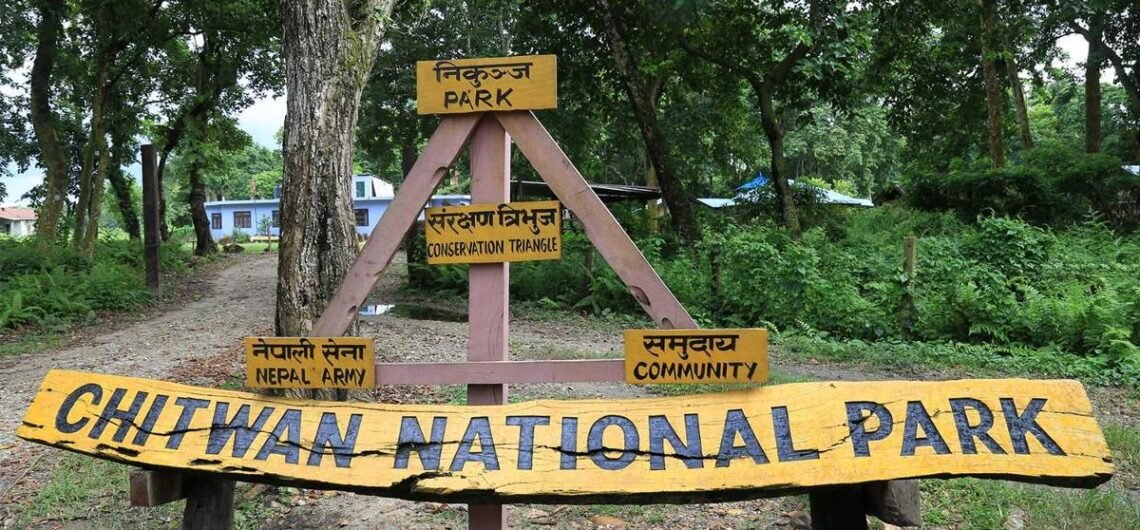Chitwan National Park is a gem waiting to be explored, Nestled in the heart of Nepal. From its rich biodiversity to its vibrant culture, this UNESCO World Heritage Site offers an unforgettable experience. Join me as I take you through a detailed itinerary for an adventure-packed journey through Chitwan.
Chitwan National Park Day 1: Arrival and Tharu Culture Experience
Morning:
Arrival in Chitwan: After a scenic drive from Kathmandu or Pokhara, you’ll arrive at your lodge near the park. Check-in, refresh, and get ready to explore.
Welcome Drink and Orientation: Enjoy a refreshing welcome drink as the lodge staff gives you an orientation about Chitwan National Park and the activities planned.
Afternoon:
Lunch at the Lodge: Savor a delicious Nepali meal featuring local flavors and fresh ingredients.
Tharu Village Tour: Immerse yourself in the local culture with a visit to a Tharu village. The Tharu people are indigenous to the Terai region, and their unique lifestyle, traditions, and dances offer a fascinating glimpse into their world.
Evening:
Tharu Cultural Dance: As the sun sets, enjoy a vibrant cultural dance performance by the Tharu community. The rhythmic beats and colorful costumes are sure to mesmerize you.
Dinner at the Lodge: Relish a hearty dinner and unwind for the night, preparing for an adventurous day ahead.
Day 2: Jungle Safari and Elephant Adventures
Morning:
Begin your day with a satisfying and robust meal.
Canoe Ride and Jungle Walk: Begin with a serene canoe ride on the Rapti River. As you glide through the water, keep an eye out for crocodiles and water birds. This is followed by a guided jungle walk, where you might spot rhinos, deer, and an array of bird species.
Afternoon:
Lunch at the Lodge: Return to the lodge for a well-deserved lunch.
Elephant Safari: One of Chitwan’s highlights, the elephant safari, takes you deep into the jungle. Riding on the back of an elephant, you’ll traverse through thick forests and grasslands, providing an excellent vantage point to spot wildlife, including the elusive Bengal tiger.
Evening:
Elephant Bathing: Head to the river to watch or participate in the elephant bathing session. It’s a delightful experience to see these gentle giants enjoying their time in the water.
Dinner and Campfire: End your day with a cozy campfire, sharing stories with fellow travelers over a delicious dinner.
Day 3: Bird Watching and Jeep Safari
Morning:
Early Morning Bird Watching: Chitwan is a bird-watcher’s paradise with over 500 species. An early morning bird-watching tour with a naturalist guide will let you spot some of the rarest birds in the region.
Breakfast: Return to the lodge for a hearty breakfast.
Afternoon:
Jeep Safari: Explore the deeper parts of Chitwan National Park on a jeep safari. The open-top jeeps allow for excellent wildlife viewing and photography opportunities. Keep your camera ready for potential sightings of leopards, wild boars, and various other animals.
Evening:
Visit to the Crocodile Breeding Center: Learn about the conservation efforts to protect the gharial and mugger crocodiles at the breeding center.
Dinner and Relaxation: Enjoy your final dinner at the lodge, reflecting on the incredible experiences of the past few days.
Day 4: Departure
Morning:
Breakfast: Enjoy a leisurely breakfast.
Optional Activities: Depending on your departure time, you can opt for a short nature walk or visit the nearby elephant breeding center.
Afternoon:
Check-out and Departure: Bid farewell to Chitwan National Park as you head back to Kathmandu, Pokhara, or your next destination.
Historical and Cultural Insights
Chitwan National Park, established in 1973, was Nepal’s first national park and became a UNESCO World Heritage Site in 1984. Its history is intertwined with the conservation efforts spearheaded by King Mahendra, who recognized the importance of preserving this unique ecosystem. The park is home to the one-horned rhinoceros, Bengal tiger, and a myriad of other wildlife species.
The Tharu people, native to the Terai region, have coexisted with the wildlife of Chitwan for centuries. Their traditional knowledge and cultural practices are invaluable to the conservation efforts in the region. Engaging with the Tharu community offers a deeper understanding of the harmonious relationship between humans and nature in Chitwan.
Practical Tips
Best Time to Visit: The ideal time to visit Chitwan is from October to March when the weather is pleasant, and wildlife sightings are more frequent.
What to Pack: Comfortable clothing, sturdy walking shoes, binoculars, insect repellent, and a good camera are essentials.
Health Precautions: Carry necessary medications, and consult your doctor regarding vaccinations and malaria prophylaxis.
Chitwan National Park is a haven for nature lovers, adventure enthusiasts, and cultural explorers. This itinerary ensures you experience the best of what Chitwan has to offer, leaving you with memories to cherish for a lifetime.
Chitwan National Park Official Site for Registration —-> https://chitwannationalpark.gov.np/
